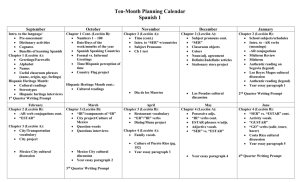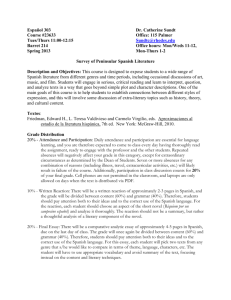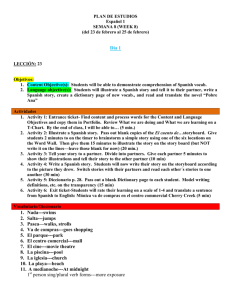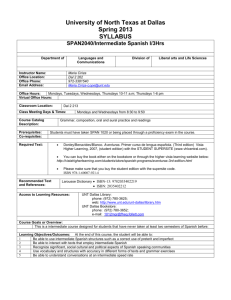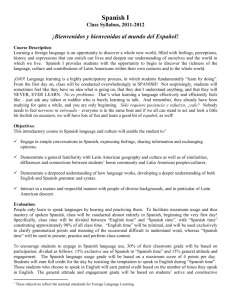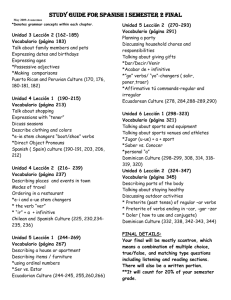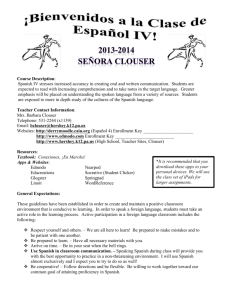SPN 153 - Tiffany Judy
advertisement
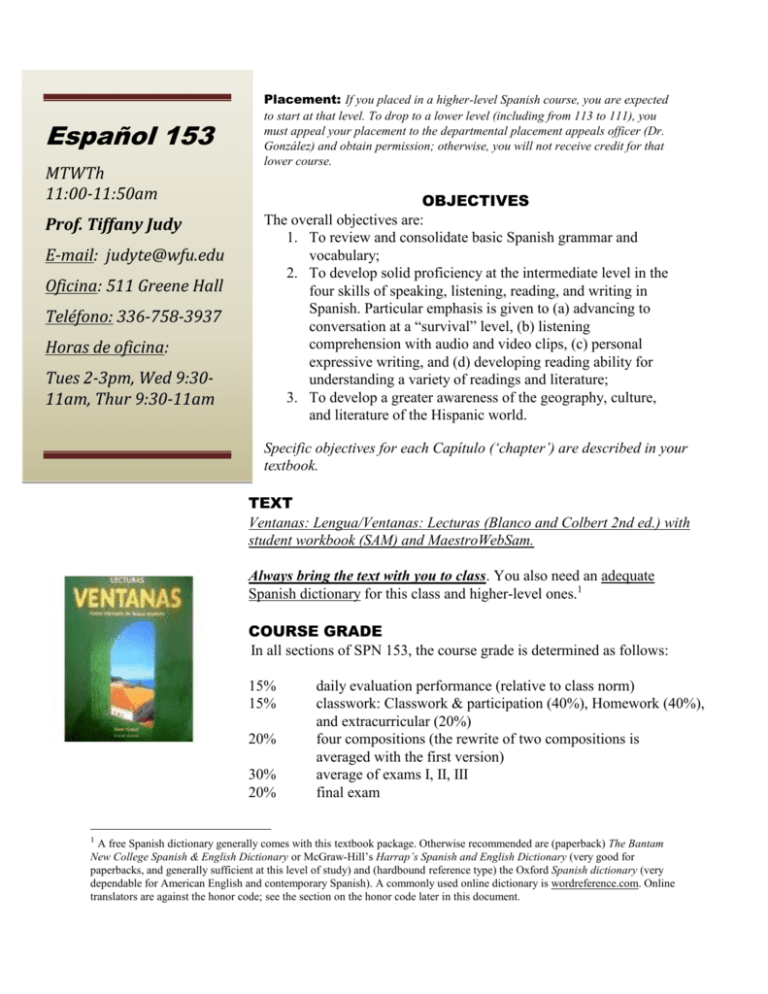
Español 153 MTWTh 11:00-11:50am Prof. Tiffany Judy E-mail: judyte@wfu.edu Oficina: 511 Greene Hall Teléfono: 336-758-3937 Horas de oficina: Tues 2-3pm, Wed 9:3011am, Thur 9:30-11am Placement: If you placed in a higher-level Spanish course, you are expected to start at that level. To drop to a lower level (including from 113 to 111), you must appeal your placement to the departmental placement appeals officer (Dr. González) and obtain permission; otherwise, you will not receive credit for that lower course. OBJECTIVES The overall objectives are: 1. To review and consolidate basic Spanish grammar and vocabulary; 2. To develop solid proficiency at the intermediate level in the four skills of speaking, listening, reading, and writing in Spanish. Particular emphasis is given to (a) advancing to conversation at a “survival” level, (b) listening comprehension with audio and video clips, (c) personal expressive writing, and (d) developing reading ability for understanding a variety of readings and literature; 3. To develop a greater awareness of the geography, culture, and literature of the Hispanic world. Specific objectives for each Capítulo (‘chapter’) are described in your textbook. TEXT Ventanas: Lengua/Ventanas: Lecturas (Blanco and Colbert 2nd ed.) with student workbook (SAM) and MaestroWebSam. Always bring the text with you to class. You also need an adequate Spanish dictionary for this class and higher-level ones.1 COURSE GRADE In all sections of SPN 153, the course grade is determined as follows: 15% 15% 20% 30% 20% 1 daily evaluation performance (relative to class norm) classwork: Classwork & participation (40%), Homework (40%), and extracurricular (20%) four compositions (the rewrite of two compositions is averaged with the first version) average of exams I, II, III final exam A free Spanish dictionary generally comes with this textbook package. Otherwise recommended are (paperback) The Bantam New College Spanish & English Dictionary or McGraw-Hill’s Harrap’s Spanish and English Dictionary (very good for paperbacks, and generally sufficient at this level of study) and (hardbound reference type) the Oxford Spanish dictionary (very dependable for American English and contemporary Spanish). A commonly used online dictionary is wordreference.com. Online translators are against the honor code; see the section on the honor code later in this document. 20% Final exam Grading Scale All 100-200 language classes use the Wake Forest standard grading scale for numeric scores: 93–100 = A 88–89 = B+ 78–79 = C+ 68–69 = D+ <60 = F 90–92 = A83–87 = B 73–77 = C 63–67 = D 80–82 = B70–72 = C60–62 = DWhile tests might have up to 2% of extra-credit questions at the end, there are no “extra-credit projects” to compensate for unsatisfactory performance on the above measures of ability in the language. Note that we adhere to the following definitions of grades from the WFU Bulletin: A = Exceptionally high achievement A-, B+, B = Superior B-, C+, C = Satisfactory C-, D+, D, D- = Passing but unsatisfactory F = Failure I = Incomplete CLASSWORK We meet as a class 4 days per week (M-Th). Except for brief clarifications, this class will regularly be conducted in Spanish, as per departmental policy. In class, we focus on learning through listening and on developing proficiency through speaking; we will be doing groupwork, pairwork, and wholeclass activities to practice communication. For the most part, these activities will be based on the activities and readings assigned for homework, so it is important to prepare well for class. NOTE: The Department of Romance Languages has a policy of no eating, drinking, chewing gum, or smoking in the classroom. You must turn off any sound-making devices (including cell phones) before you enter the classroom. Also, take care of any personal needs (i.e. going to the bathroom, filling water bottles) BEFORE class begins. To prepare for class: 1. Look over the new points featured in the assigned material, and complete all listening and writing practice assigned for homework on Sakai. 2. Study the vocabulary that is introduced in class and then summarized at the end of the chapter. 3. Review recent material. PARTICIPATION EVALUATION CRITERIA (Judy; a separate Participation Rubric will be given to you ~every 2 weeks) Regular attendance is VITAL in a language class. For that reason, unless on official university business, or for a documented medical condition requiring more than five absences, each absence after the fifth will result in a decrease of one percent on the final grade for the class. 1. Do you have a good attendance record? 2. Do you arrive on time? 3. Do you meticulously and neatly prepare for class (i.e. reviewing class notes and doing assigned homework)? 4. Do you ask thoughtful questions? 5. Do you take pair and group work seriously? 6. Does your class preparation help you offer solid contribution to pair and group work? 7. Do you speak only in Spanish? 8. Do you often volunteer or are you usually the “victim”? Note: I use computer projection in class to illustrate and discuss the material, but I cannot release my PowerPoints or place them in Sakai; they contain copyrighted material that “educational fair use” allows as a teaching aid but not for general distribution. HOMEWORK There will be at least one written exercise per chapter to turn in (“Para entregar”= PE) that I will collect to grade.2 Since this writing reinforces material at a certain point in the course, late work will be penalized with a lower grade (1/2 letter grade per day it is late. NOTE: Homework not turned in at the beginning of class will be counted one day late). Homework Submission Guidelines Best = Typed, double-spaced, stapled. Assignment is identified (i.e. Act. 15-G, SAM, p. 157). Acceptable = Handwritten neatly on notebook paper or on SAM page, name written on all pages. NOT acceptable = Electronic or e-mail submission. No credit will be given for late online exercises. A word to the wise: Even though not all activities are turned in for a grade, they are most effective when carried out regularly as assigned; they are practically worthless for language learning if you postpone them and then try to do them all in a huge marathon session. Remember, there are printers available in the library if your printer is not working. Homework not turned in at the beginning of class for any reason will be counted as late. Virtual Lab. The audio, video, and computer components of this course can be found at: https://www.vhlcentral.com. On most Fridays, as indicated on the syllabus, we will not have regular class. Instead, you may use this time to work on your own with the activities on WebSAM. For each chapter, you will complete at least 5 exercises before 12 midnight of the day following completion of each chapter in class. Two of these exercises must include listening, one must be the “Después de leer” from one of the readings in Lectura, and the two other should be a structure or vocabulary exercise that will be most helpful to you. In most cases, I will indicate which exercises must be done for grading. Of course, you are encouraged to do additional exercises for practice. When an essay is assigned in the workbook, you don’t have to write it there and then tear the page out, but rather can write it on a separate sheet or, even better, on your computer. See section at the end of this syllabus for how to type Spanish characters. 2 Online Sign-Up Instructions Please check the calendar site regularly, as events are added during the semester. Using the Google Chrome browser, go to the Spanish Activity Calendar: http://romancelanguages.wfu.edu/spanis h-calendar.html Click on a specific activity for a brief description. Unless the event is designated as “No sign-up necessary,” click the link and sign up as indicated. Please be considerate of others; if you are unable to attend, please remove your name from the list so that someone else may sign up. If there is NO SIGN-UP box after an event, no registration is needed; you can simply attend. The extracurricular component to this course: The Department of Romance Languages sponsors a number of activities and talks in Spanish. During the semester, please check the calendar (in the syllabus and on Sakai) for event dates and information. Please plan ahead to ensure that you are able to attend 2 activities before their due dates. You are encouraged to attend as many events as possible to increase your experience with the language and culture; but you are also required to choose any two of them during the semester and write up a one-page report for each (in Spanish). The reports should be 25% summary of the event you attended and 75% analysis of what you learned from the event. The due dates are indicated on the syllabus. Note: Movies seen on your own that are not sponsored by the department do not count for the extracurricular activity. You must attend an approved event. DAILY EVALUATIONS At the beginning of each class, there is a daily evaluation to monitor your daily preparation and progress, and to help prepare for exams. This evaluation (about 4 brief questions, oral and written) will cover the material you have prepared for the day, and the grade is simply the number of correct answers (with one additional point for being present throughout the session). Your evaluation-point total will be converted to a grade relative to the class norm at the end of the semester. There are no make-ups for daily evaluations missed due to tardiness or absence (excused or unexcused); however, (a) during the last class session there will be a makeup Bonus Round of 12 points for all who attend, and (b) at the end of the course your 4 lowest daily evaluation scores (including up to 4 zeros) will be dropped. TESTS3 On the four dates indicated on the syllabus, we have full-period exams. These are cumulative but not comprehensive: they focus on the recent quarter of the material, but build on an accumulation of skills and knowledge from the course so far. A week before each exam, you will receive a study guide with sample questions. Test and Composition Make-Up Policy If you must miss an exam or an in-class composition, a makeup is available if (1) You directly notify and give a valid reason to your instructor before exam/composition time, and (2) Provide documentation, if warranted, and make up the test or composition as soon as you can return. Otherwise, a missed exam or composition results in a grade of zero. (Note that the grade of “I”=incomplete is available only under the terms in the WFU Bulletin.) COMPOSITIONS During this course, and as preparation for writing in SPN 212/213/216, you will write a composition in Spanish in each of the following four categories or topics. Your instructor will announce further specifications of topics and deadlines and/or features to include. In each case, it should have a title and correct spelling, including punctuation and accent marks. Composición 1: Focus on the present (don’t use the past) and try to incorporate the grammar and vocabulary we have studied (e.g. interesting adjectives), as fully and accurately as you can. Use the guide and some of the suggestions on page 57 of Ventanas: Lengua. Although you should plan your composition and bring the OUTLINE written on a 3” x 5” index card, you write the composition in class. The composition must be at least 200 words. Count the words and write the number at the end of your composition. Composition 2: Narración. Focus on the preterite/imperfect distinction. The composition must be at least 200 words. Count the words and write the number at the end of your composition. Composition 3: Una tesis y argumentos. Choose an issue you feel strongly about (in an area such as university life, the family, unemployment, the importance of diet, technology, government intervention, etc.). State a thesis (position) in that issue that you wish to defend and then argue in favor of it, and against alternatives. This essay should use as effectively as possible the grammar (e.g. indicative/subjunctive) and vocabulary studied. Sharpening argumentative writing is an important skill in a college education, and tackling it in a second language adds an interesting perspective. Review the Taller de escritura on pages 21, 45, 71, 95, 121, 147 and 173 in Ventanas: Lecturas for guidance, ideas, and suggestions. About 300 words. Write the number at the end of your composition. Composition 4: Un análisis literario. You will find yourself using several of the strategies and tools practiced in the first three compositions. Review all the Taller de escritura in Ventanas: Lecturas for some guidance, ideas, and suggestions. This essay should be at least 300 words. Write the number at the end of your composition. 3 Remember that proficiency in a language is a skill. The evaluations and tests examine not only what you know, but how well you know it and can use it, and they are therefore timed. Extra time will not be given without supporting documentation from the Learning Assistance Center. Accommodations If you have a disability that may require an accommodation, please contact the Learning Assistance Center (336-758-5929) within the first 2 weeks of the semester. Also, please consult with me as soon as possible so we can discuss strategies to help you be successful in this course. THE HONOR CODE: GRADED WORK MUST BE YOUR OWN WORK HONOR SYSTEM (definition in the WFU Bulletin) Wake Forest University upholds the ideals of honor and integrity. The Honor System is central to University life; its essence is a commitment by each person to do what is right and abide by community standards. Each student is pledged to be trustworthy in all matters, and a violation of that trust is an offense against the community as a whole. In the specific terms of the Honor Code, a student pledges in all phases of life not to cheat, plagiarize, engage in other forms of academic misconduct, deceive, or steal. The strength of the Honor System derives from the commitment of each and every student to uphold its ideals. THE HONOR CODE AS IT APPLIES TO THIS COURSE Any work turned in for a grade must be your own individual work, and any sign of collaboration, plagiarism, or other unauthorized assistance will be regarded as cheating and may be turned to the Judicial Council for investigation. You may receive no help (no tutors, no friends, and no translators [human, machine, or web-based]) in the preparation of your compositions or other written work. The ideas and the language must all be your own. If you are unacquainted with the exact meaning of plagiarism or have any doubts about the materials you are using, ask me. Plagiarism is academic theft. It refers to the use of another’s ideas or words without proper attribution or credit. An author’s work, either published in the traditional manner or posted in the Internet, is his/her property and should be respected by documentation. Credit must be given: 1. For every direct quotation (even if you are translating it or changing a couple of words). 2. When a work is paraphrased or summarized in whole or in part in your own words. 3. For information which is not common knowledge. ROMANCE LANGUAGES DEPARTMENT GUIDELINES FOR TUTORS (OR OTHER HELP). In general terms, tutors should explain questions and problems and guide students' work. They cannot do the work for the students; nor can they translate (or encourage translation of) the material into English or from English. Essays, reports or any written assignment should be written completely by the student. By that we mean that students cannot consult with anyone about that assignment. Those essays should reflect what students have learned in class. To write them with the help of the tutor will not allow us to determine what students have learned on their own and how they are able to apply it. Since we clearly specify that the work needs to be the student's and no one else's, the help of the tutor in those assignments will constitute a violation of the Honor Code. CAN I GET HELP FROM OTHERS? It depends on the kind of “help.” You should always seek out Spanish speakers, use the language with them, and learn from them, and the department makes tutors available. Bear in mind, though, that there’s a difference between knowing a language and being able to teach it. (Quickly, now: as a native speaker of English, explain how and when to use the. Or the difference between make and do. Or the reason why we use an infinitive after want.) Also, the purpose of assignments is to challenge you to use the material and to check your own command over it; it will be a violation of the Honor Code to get unauthorized help on any such work counting as part of your grade. Check with me if you’re unsure about what’s okay, but here are examples: Allowed: (while brainstorming for a presentation): “I need help with tennis vocabulary. Is pelota the right word for a tennis ball? What’s the word for serving it? What’re the names of the different returns? Talk to me in Spanish about your experiences with tennis (etc.).” Disallowed: “How do you say ‘Next, you rush up to the net and anticipate an overhand return?” Or: “how about checking over this paragraph for me?” Or: “Tell me what to do for number 2 in Ejercicio D.” SOME ADVICE ON LEARNING A FOREIGN LANGUAGE 1. Use the language! Take advantage of every opportunity to speak, hear, and read it; watch Univisión on TV (cable 70), listen to Hispanic radio and music, come to our Spanish departmental events, talk with Spanish speakers, etc. Even if you don’t understand every word, you can practice getting the gist of the conversation, and without even realizing it, you are absorbing correct pronunciation and speech patterns. 2. Don’t be afraid to make mistakes. Be patient and give yourself time to learn the language. Remember it’s natural for a new language to be difficult, and making mistakes is part of the learning process 3. Develop good study habits! Study with full concentration, but for brief periods. Don’t merely stare at the book; engage actively with the material. Here are some ideas to get you started: Vocabulary Study Ideas: Say the words out loud. Write sentences with them that relate them to other Spanish words. Try to define the words in Spanish. Brainstorm associated vocabulary words. (i.e. el baño: el lavabo, el inodoro, la bañera, la toalla, la ducha, ducharse, cepillarse los dientes, etc.) Incorporate the words into your daily routine. (i.e. Name the articles of clothing that you put on in the morning. Name as many different types of food as you can when you are in the Pit or the grocery store.) Verb Study Ideas: Say the conjugations out loud. Make verb charts, and look for patterns among irregular verbs. Narrate your daily routine. Don’t think: “I’m listening to music now,” but “Escucho música ahora.” Be aware of verb conjugations in articles and stories that you read in class. 4. Avoid translation. Although it may seem safer to translate, it becomes a trap: you develop no real skill in Spanish, and it doubles your processing time (which becomes a problem on timed tests). Rather than thinking Spanish word = English word, associate mental pictures with Spanish words. Try to speak, hear, read, and write Spanish without resorting to English —and it’ll seem increasingly natural (and quicker) for you. 5. When you have a question, ask it! I can guarantee you that someone else in the class has the same question. If your question is not answered in class, please come by during my office hours (or make an appointment). Don’t let a small question snowball into a huge problem by putting it off! Using your computer, typing special characters There are many resources about Hispanic countries (not to mention on-line Spanish newspapers and the like) that you can access on the Web. Be careful with plagiarism and cheating; always provide the source. Use your computer for writing in this course, and learn to type symbols like accents, ñ, ¡, ¿ from the keyboard instead of adding them by hand. The best way is to use the “United States International” English keyboard, which allows you to type all the special characters for Spanish using the right Alt key + ?, !, n, N, a, e, i, o, u to get ¿, ¡, ñ, Ñ, á,é,í,ó,ú. These combinations work in Word, PP, the web, etc. Here are the instructions: In Control Panel, click on Language > Options > Add an input language. Find English—United States International. Click on Select > Save. At the top (or bottom) of your desktop, there should now be a "language bar"= keyboard toggle button (a miniature keyboard) that lets you go back and forth between the two keyboard settings--"English (United States)" and "US International." As part of the standard WFU software load, your IBM ThinkPad comes with spell-checkers and grammar-checkers for Spanish (and other common languages) as well as English. You may use these in Spanish homework you write on your computer, but be extremely careful with them. They can become a crutch, and we have tried them out and found numerous flaws: they mechanically flag “errors” that are not really errors in context, they miss a lot of things that are errors in context, and they can never determine whether a sentence says what you intend it to say. To succeed in language study you should learn to monitor and correct mistakes yourself. There are also translator programs, but despite the hype (“USE SPANISH WITHOUT STUDYING GRAMMAR!”), they’re mere data-bases that match one word to another and convert mindlessly. The mistakes they make are different from those of a human mind and once detected on any work you turn in, their use will be treated as academic dishonesty in this course. (See the section “Do your own work” on this policy sheet.) EMERGENCIES In the event of an emergency such as a pandemic crisis or natural disaster that prevents classes from meeting regularly, students will be expected to continue their coursework to the best of their ability. If the University should close, Sakai (or equivalent) will be the main source of information for the course. I will be available via email and U.S. mail. In the event that Internet access is limited and U.S. mail is the only method for contact, you will be provided with complete access information for me at home, including phone numbers. The syllabus may be adjusted for individuals who were absent, or for the entire class if dismissed by closing. If you are experiencing flu-like symptoms (H1N1 is distinguished by a fever of 100º F or higher, and may also include cough, sore throat, runny or stuffy nose, body ache, headache, chills, unusual fatigue, diarrhea or vomiting), you should remain in your room in an effort to avoid spreading your illness to others (CDC guideline is at least 24 hours after the fever is gone), and call Student Health (758-5218) immediately. Be prepared to show evidence of a legitimate reason for your absence from class. As soon as you can, contact your instructor to explain your absence and to work out a plan to complete any missed work. Español 153: Ventanas (2ª ed.) Syllabus/Plan del curso Primavera del 2014 This syllabus shows what you need to prepare before each class session. Your daily homework is to read all the assigned pages for each day. On “repaso” (pre-exam review) days, your preparation is to review. Remember that you also do the LABORATORIO VIRTUAL every week (page 3). Fecha 14 de enero 15 de enero 16 de enero 17 de enero Lengua Introducción al curso. Lección 1: 1-5 Lección 1: 14-21 Lección 1: 22-25 Introducción al laboratorio virtual (in class) Lectura 20 de enero 21 de enero 22 de enero 23 de enero 24 de enero Día de fiesta: MLK Lección 1: 26-30; PE: 1.2 #6 Lección 2: 31-35, 44-47; WebSAM due midnight Lección 2: 48-51 Lección 2: 52-55 27 de enero 28 de enero 29 de enero 30 de enero 31 de enero Lección 2: 56-60; PE: 2.2 #5 Escribir la composición 1 en clase; WebSAM due midnight Lección 3: 61-65, 74-77 Lección 3: 78-85 Laboratorio virtual 312-top of 314 3 de febrero 4 de febrero 5 de febrero 6 de febrero 7 de febrero Lección 3 Lección 3: 86-90; PE: 3.2 #5 Repaso (y parte auditiva) del examen 1; WebSAM due midnight EXAMEN 1 Laboratorio virtual 65-71 10 de febrero 11 de febrero 12 de febrero 13 de febrero 14 de febrero Lección 4: 91-95, 104-109 Lección 4: 376-377 Lección 4: 110-117 Lección 4: 118-122 ; PE: 4.4 #2 Laboratorio virtual; WebSAM due midnight 17 de febrero 18 de febrero 19 de febrero 20 de febrero 21 de febrero Lección 5: 123-127, 136-139 Lección 5: 140-143 Lección 5: 144-147 Lección 5: 148-152; PE: 5.2 #5 Laboratorio virtual; WebSAM due midnight 24 de febrero 25 de febrero 26 de febrero 27 de febrero 28 de febrero Escribir la composición 2 en clase Lección 6: 154-157, 166-169 Lección 6: 170-173 Lección 6: 174-177 Laboratorio virtual 3 de marzo Lección 6: 178-182; PE: 6.1 #5; Composición 2 re-write due 12-16 8-11 36-40 91-95 86-90 100-105 110-114 126-131 136-140 4 de marzo 5 de marzo 6 de marzo 7 de marzo Lección 7: 183-187, 196-199 Repaso (y parte auditiva) del examen 2; WebSAM due midnight EXAMEN 2 Laboratorio virtual; Extracurricular activity 1 due 8-16 de marzo Receso de primavera 17 de marzo 18 de marzo 19 de marzo 20 de marzo 21 de marzo Lección 7: 200-201 Lección 7: PE: 7.2 #5 Lección especial: El discurso indirecto; WebSAM due midnight Lección 8: 212-215, 224-227 Laboratorio virtual 24 de marzo 25 de marzo 26 de marzo 27 de marzo 28 de marzo Lección 8: 228-231 Lección 8: 232-235 Lección 8: 236-240, 396-397; PE: 8.1 #6 Escribir la composición 3 en clase; WebSAM due midnight Laboratorio virtual 31 de marzo 1 de abril 2 de abril 3 de abril 4 de abril Lección 9: 242-245, 254-255 Lección 9: 256-259 Lección 9: 260-261 Lección 9: 262-266; PE: 9 #5; Composición 3 re-write due Laboratorio virtual; WebSAM due midnight 7 de abril 8 de abril 9 de abril 10 de abril 11 de abril Repaso (y parte auditiva) del examen 3 EXAMEN 3 Lección 10: 267-271, 280-281 Lección 10: 282-283, 284-285 Laboratorio virtual 14 de abril 15 de abril 16 de abril 17 de abril 18 de abril Lección 10: 286-290, 406-407; PE: 10.1 #4 Escribir la composición 4 en clase; WebSAM due midnight Lección 11: 292-295, 304-305 Lección 11: 411-412 No hay clase 21 de abril 22 de abril 23 de abril 24 de abril 25 de abril Lección 11: 306-309, 310-313, 411-412 Lección 11: 314-318; PE: 11.1 #4 Lección 12: 319-323, 332-335; WebSAM due midnight Lección 12: 336-339 Laboratorio virtual: Extracurricular activity 2 due 28 de abril 29 de abril 30 de abril Lección 12: 340-345 Lección 12: 346-350; PE: 12.1 #5 Repaso para el examen final; WebSAM due midnight Examen final: 2pm, Thursday, May 8th, 2014 167-173 188-192, 121, 147 219-225 241-244, 315 257-260 266-270 284-289
